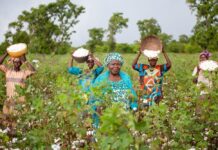By: Wanga Pholi, Assistant Programme Manager for Agriculture at Seriti Institute
Household gardens have always played a positive role in addressing food insecurity and malnutrition in our communities. Food gardens have proven to be the source of basic foods, and this has also demonstrated by the intervention from Seriti Institute in collaboration with the Global Environment Facility (GEF) Small Grants Programme (SGP) which started in October 2020. The main objective of the initiative was to promote rural and peri-urban grassroots farming activities and sustainable agribusiness development in the Vhembe biosphere reserve. Initially, 20 beneficiaries from Ngwenani Ya Themeli and 20 from Elim Vleifontein were selected in line with specific demographic objectives, 65% women and 69% youth participated in the project, of which 65% were unemployed – demonstrating the indirect benefit of creating work opportunities for the unemployed through farming.

From the initial 40 beneficiaries participating in the project, ten household producers were selected to receive enterprise development assistance and training which covered critical topics to equip farmers with the relevant knowledge and skills to continue their farming journey.
Importance of crop specialisation for a subsistence farmer.
Of the ten household producers selected for the enterprise development training, one farmer, Remember Phaswana from Vleifontein performed exceptionally well. Before the intervention, he had been cultivating 0.25 hectares, and to date, he is farming 1.5 hectares. Remember used to plant less than 300 seedlings on his land, but after becoming a participant in the programme, he expanded his production to over 3000 seedlings, highlighting the impact the GEF funded project has had. The expansion of land was largely driven by the support he received in the form of training on permaculture, enterprise development training, business planning and company registration from Seriti Institute and the National Youth Development Agency (NYDA). He started to make a noticeable profit from the sale of his cabbages saying:
“I received the support of 1500 cabbage seedlings from Seriti Institute for my backyard garden and with the enterprise development training offered, I was encouraged to venture into farming as a business and not primarily for my family’s consumption. I made over R7000 from my cabbage sales last year and this was the first high profit ever since I started farming. I used the profit generated from the cabbage production sales to build a chicken house and bought over 200 broiler chickens from which I use the chicken manure to fertilise the garden soil as an organic method, with the current harvest of maize and white pumpkin”.
Remember used with the current harvest profit of maize and white pumpkin and is now expanding into piggery production.
Entrepreneurship Development Training as an important tool for agribusiness
Through the programme, farmers were capacitated on creating business plans, financial management, bookkeeping, business registration, marketing, pricing, and the dynamics of business management. Farmers were trained on how to use the vegetable planting calendar as a tool to provide guidance on when to plant which crops. Beneficiaries were taught about the different ways of dealing with pests and diseases and received practical skills training on techniques in the management of water, and the importance of diversification in the business of farming All operations within this project were guided by Seriti Institute’s operational approach in developing farming enterprises. One participant, Puleng Tshisamphiri from Makhado, was the first farmer from the enterprise development group to receive the training and certificate. Puleng is currently in the process of applying for the NYDA farming grant commenting:
“I wish all youth would realise the importance of this training because it is a lifetime opportunity for any emerging young entrepreneur who is hungry and ready for success. The future looks bright and for this, I would like to extend my gratitude to the NYDA and Seriti Institute for making this possible”.
Beneficiaries also received their business enterprise registration certificates. The benefits of the farmers owning these certificates is that it increases the chances of obtaining funding for their businesses, raises supplier standards higher especially when they will approach local retail stores and enables them to sell their produce at formal markets where having a permit and business registration will be required. An important aspect going forward with Seriti’s agriculture work is to provide farmers with training on safety standards and compliance accreditation.
Processing maize to maize meal using indigenous method
Seriti Institute provided farmers with mealies and pumpkin seeds since these crops perform well during rainy seasons. Crop yields were successful, and all farmers are currently harvesting maize. Some farmers are selling grilled mealies to the local community, while others plan to take their harvest to millers and keep some for consumption. Tshikovhela Makwarela, was delighted to harvest her maize, sun-dried her cobs and take them to the local miller where she got five 80kgs bags of maize meal saying about livelihood improvement:”
I am delighted that I will not purchase maize meal for close to a year, this means that I can allocate this money to close other gaps in the household”.
Seriti Institute encourages and supports the development of existing and new farming enterprises. The support includes seedling, irrigation, and garden tools donations to local small-scale farmers who are passionate about crop farming.
This project achieved its main objectives of strengthening food security within the community by establishing at least four sustainable farming enterprises from the group of selected beneficiaries while promoting permaculture farming to encourage natural farming practices.









